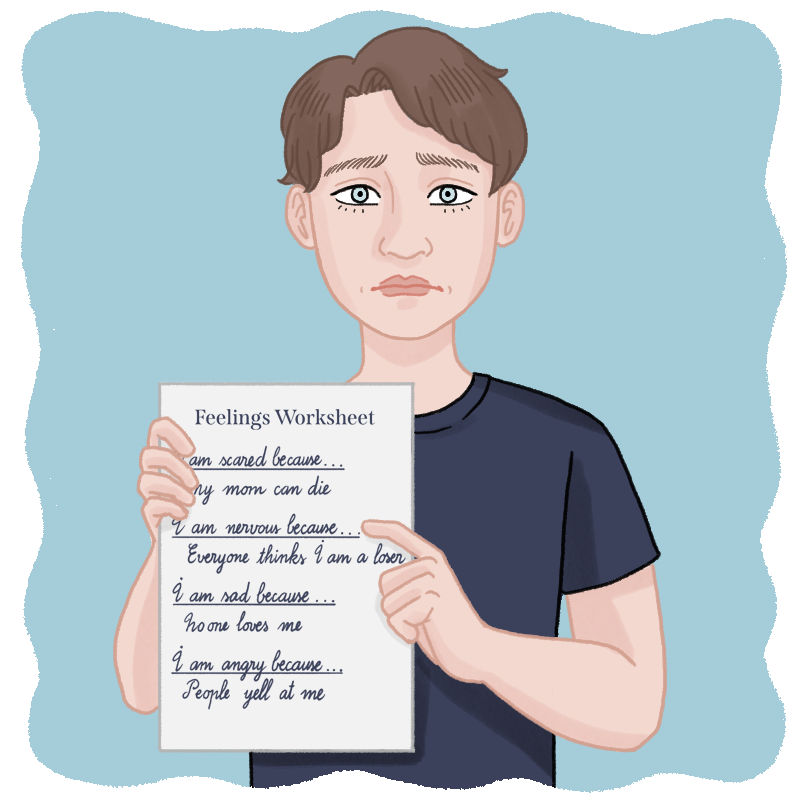





Chapter 3. Key Trauma Emotions Copy

After guiding Brian through mitigating all his unhelpful thoughts, you ready yourself to move him on to untangle his emotions. You make the decision, as usual, to substitute the word, “emotions” with “feelings”—you’ve had much better luck using that with children in the past.
“Brian, now it’s time to talk about your feelings. Did you have a chance to do that feelings worksheet I gave you last time?”
“Oh, yeah, I did it.” He pulls out the crumpled paper. “Here it is!”
“Great, thank you!” you respond enthusiastically. “Why don’t we start by sharing some of your responses on there?”
“Would you like me to read it?” Brian asks.
“Yeah, that would be great—I would love to hear what you have.”
“Ok,” he says as he smooths the paper a bit. Then Brian reads aloud the following from his Feelings 2 Worksheet:
“I am scared, because…
My mom can die”
“I am nervous, because…
Everyone thinks I am a loser”
“I am sad, because…
No one loves me”
“I am angry, because…
People yell at me”
He puts the paper flat and looks up cautiously.
“Thank you so much for completing that, Brian! Now, I want to discuss some of the reasons why you are having these feelings. We’ve been looking at your life timeline—do you think there might be a connection between events on your life timeline and your feelings?”
He shrugs. “I guess there might be a connection.”
“I think that it makes sense that you have some of these feelings, given the experiences you’ve had before.”
“Yeah…”
“Brian, do you remember the square we mentioned before?”
Brian juts his jaw forward to think. “Yes,” he affirms.
“And do you remember what the four corners of the square are?”
“Umm…I think, it is my feelings, what I am thinking…how I behave, and…how I feel in my body.” He looks at you questioningly.
“Wow,” you exclaim, “you are really a good learner! Yup, those are exactly the four corners of the square. So, if we take for example one of the events from your life timeline—do you remember any of the events?”
Brian nods very confidently, so you ask him, “Which one?”
“I remember all of them. Do you want good or bad?”
You smile at his readiness. “Choose one of the difficult ones for me.”
“When…we came back from Disneyland and when John was there.”
“Ok, so, how would you say you were feeling?”
Brian mindlessly cracks the knuckles on his left hand as he considers. “I was feeling very, very bad. Mom and I had such a great time at Disney and John ruined everything.”
You tilt your head and ask Brian, “What does it mean when you felt ‘bad’? Can you clarify it? Can you put a feeling to it?”
He shrugs. “Bad…I dunno…”
“Does bad mean sad…angry, or scared?” You offer options.
“Sad,” he says, after mulling it over.
“Any other feelings?” you ask as you record that in your notes.
“Scared, I guess. But…angry, also.”
“So—you felt sad, scared, and angry. And what were you thinking?”
Brian switches to cracking the knuckles on his right hand and groans. “That only bad things happen to me. I can’t have good things in my life, I can’t have fun. It was so nice to be with mom in Disneyland, and when we came back home, John was there and it was horrible.”
You note as much of this as possible and expand to the next corner. “How does that make you feel in your body?” you query.
“I dunno. Heavy,” Brian responds as he shrugs and lets his arms fall heavily by his sides.
“How does that make you behave?”
He interlaces all his fingers into a giant fist and furrows his brow. “I wanted to smash something,” he grumbles. “And just be left alone, to be on my own, in my room all day.”
“Did you actually smash anything?” you ask in an even tone.
“No,” he concedes, letting his hands fall apart back into his lap.
“So, you wanted to be on your own. Do you see how the experiences we have had influence how we feel and how we think and how we feel in our body, and ultimately how we react?”
“Yeah.”
You smile and reference your notes from last session. “Brian, you also mentioned in your narrative that you felt ‘awkward’. Can you tell me what you meant by that?”
“Awkward?” he asks.
“Can you describe to me what that feeling is, what it means to be awkward?”
He begins, “To be awkward, I guess is…”
You interrupt to clarify, “Can you describe within the situation?”
“Oh, like when we were at the gas station and my mom’s boss yelled at her, I felt awkward.”
“Right, so, if you were to put a name to that specific feeling, what would it be?”
He scrunches his nose to think. “Embarrassed maybe? Also, angry, I guess.”
“What part made you embarrassed?”
“Because it was drama—a scene.” Brian throws his hands up in the air and continues, “There were other people there and everyone was looking at us—it was very embarrassing.”
“And what about it made you angry?”
Brian cracks a few knuckles while he explains, “Because I knew that my mom stole this money to buy us food. And it made me angry that her boss reacted like that without trying to understand.”
“And did you say there was one other feeling in there?”
“Yeah—I was sad, too, because it wasn’t the first time.” Brian’s head droops toward his chest and his shoulders slump. “Stuff like that happened all the time. I just wanted to have a normal life, like a normal kid.”
“So, it sounds like oftentimes when you are experiencing feelings, it is not just one specific feeling, but a bunch of different feelings, all at the same time.”
“Yeah, that sounds right,” he nods in agreement.
“Do you remember any of the three key feelings we talked about when we did your trauma narratives and the feelings worksheets?”
“Um…when you are sad, when you’re angry…and, when you’re scared or nervous or have a fear of something.”
“Yes, exactly!” you affirm. “Thinking about these three specific feelings, is there anything that you feel we haven’t talked about yet, that you feel is important for you to say?”
He shrugs, “I guess not.”
You lean towards him and offer, conspiratorially, “You can also think about it a bit and tell me in the next session, since we’ll continue working on our thoughts and feelings.”
“Sounds good, thank you,” he responds.
“Thank you Brian,” you beam. “You are doing a wonderful job!”
